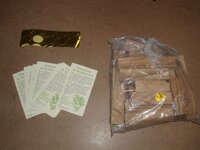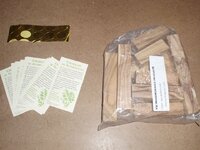penicillin
Member
- Joined
- Feb 27, 2019
- Messages
- 1,036
I posted the text below as a response in another thread. I know that people are interested in pen blank certificates and the special olive wood from Bethlehem and Jerusalem, so I decided to start a new thread to make it easier to find. Whether there is any worth to it has yet to be determined.
- - - - -
There have been discussions in other threads about certificates of authenticity. Some people think that some certificates are fake, but I am the trusting type and tend to believe them if they were purchased from a reputable source, like Exotic Blanks or Penn State or Rockler. I am not so sure I would trust random individuals on eBay or Etsy as much, but truth-be-told, your recipients would never know if they were fakes anyway.
Not all olive wood from Israel comes from the Bethlehem area. Usually those certificates say "Holy Land" without mentioning Bethlehem. Furthermore, I have a feeling that the boundaries of "Bethlehem" are somewhat generous for the purposes of olive wood certificates. Each source has its own certificate design, although they are similar to one another. In my opinion, some certificates leave room for improvement in both wording and art design.
I bought some of the ancient bog wood from Ireland that came with a downloadable certificate, but that certificate was a full page and looked like a lab report, so I designed and made my own small card size certificates to include with the pens. The pen blanks were authentic, but the certificates were my own. The certificates looked good and conveyed the information by telling the story of the wood. The gift recipients liked the pens and certificates. That is all that mattered. By the way, I looked at many different pen blank certificates to source ideas and inspiration for designing my own. None of them had a copyright mark.
Some olive wood suppliers try to distinguish between different grades of olive wood pen blanks, labelling the more grainy, colorful, figured wood "premium" or "select" or "Grade A" and charges more for them. I doubt that there is any objective standard. My hunch is that the youngest kid in the family that harvests the wood gets the job of eyeballing and sorting the pen blanks into different boxes.
In general, olive wood pen blanks come from pruning the trees, which continue to grow and produce every year. They set a good example of sustainable use.
I have had good luck with the 1 pound bag of olive wood cutoffs from Penn State, which seem to be reasonably priced for what you get. They include enough certificates, and also stickers (like small envelope seals). Many stickers on the small sheet were cut in half by accident, and others had peeled off during shipment. In my opinion, the stickers are useless. The wood and certificates are what matter in the package.
https://www.pennstateind.com/store/WXPR01BP.html
Photos: The same 1 pound bag of olive wood cutoffs from Penn State, showing each side of what I received.


- - - - -
There have been discussions in other threads about certificates of authenticity. Some people think that some certificates are fake, but I am the trusting type and tend to believe them if they were purchased from a reputable source, like Exotic Blanks or Penn State or Rockler. I am not so sure I would trust random individuals on eBay or Etsy as much, but truth-be-told, your recipients would never know if they were fakes anyway.
Not all olive wood from Israel comes from the Bethlehem area. Usually those certificates say "Holy Land" without mentioning Bethlehem. Furthermore, I have a feeling that the boundaries of "Bethlehem" are somewhat generous for the purposes of olive wood certificates. Each source has its own certificate design, although they are similar to one another. In my opinion, some certificates leave room for improvement in both wording and art design.
I bought some of the ancient bog wood from Ireland that came with a downloadable certificate, but that certificate was a full page and looked like a lab report, so I designed and made my own small card size certificates to include with the pens. The pen blanks were authentic, but the certificates were my own. The certificates looked good and conveyed the information by telling the story of the wood. The gift recipients liked the pens and certificates. That is all that mattered. By the way, I looked at many different pen blank certificates to source ideas and inspiration for designing my own. None of them had a copyright mark.
Some olive wood suppliers try to distinguish between different grades of olive wood pen blanks, labelling the more grainy, colorful, figured wood "premium" or "select" or "Grade A" and charges more for them. I doubt that there is any objective standard. My hunch is that the youngest kid in the family that harvests the wood gets the job of eyeballing and sorting the pen blanks into different boxes.
In general, olive wood pen blanks come from pruning the trees, which continue to grow and produce every year. They set a good example of sustainable use.
I have had good luck with the 1 pound bag of olive wood cutoffs from Penn State, which seem to be reasonably priced for what you get. They include enough certificates, and also stickers (like small envelope seals). Many stickers on the small sheet were cut in half by accident, and others had peeled off during shipment. In my opinion, the stickers are useless. The wood and certificates are what matter in the package.
https://www.pennstateind.com/store/WXPR01BP.html
Photos: The same 1 pound bag of olive wood cutoffs from Penn State, showing each side of what I received.


